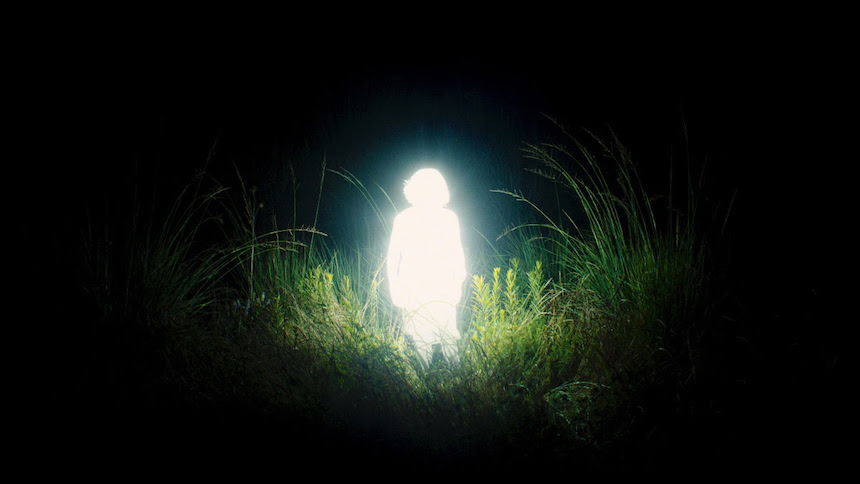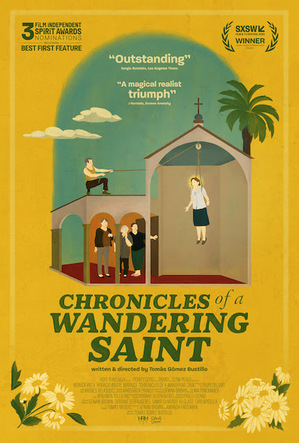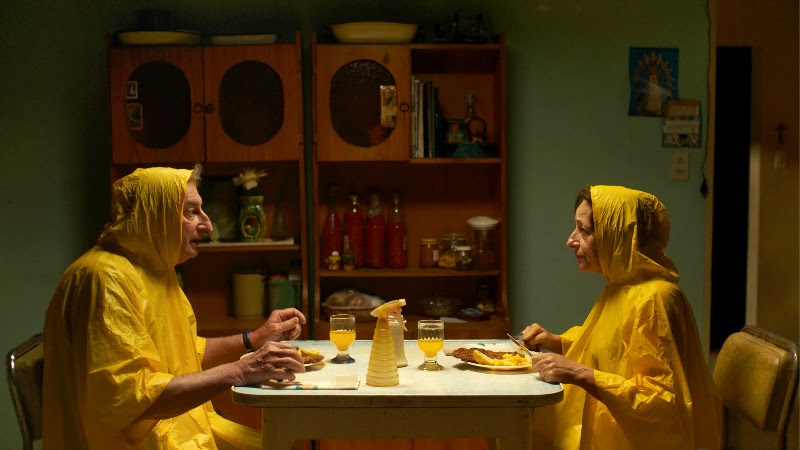CHRONICLES OF A WANDERING SAINT Interview: Director Tomás Gómez Bustillo Talks His Magical Ghost Story

Tomás Gómez Bustillo wears glasses and a warm but reserved smile. The second this young director realizes he is speaking to another Argentine, we switch to Spanish, and his sentences become longer, peppered with curses, as we like to do.
Throughout our talk, Tomás Gómez Bustillo is honest and welcoming of all questions and comments. They are mainly about his debut feature film, Chronicles of a Wandering Saint, 84 minutes long and an absolute trip. So far, Chronicles has been nominated for three Independent Spirit Awards, and swept many a prize at SXSW. It will be released commercially in theaters today; visit the official site for additional locations and release dates.
The premise: Argentina. A small town. A devout but competitive woman, Rita (Mónica Villa), desperately seeks recognition from her congregation, one made up of an overworked priest and three more women. Rita scrubs and sweeps the church, positioning herself so the light hits just so when people walk in to witness her. Chronicles really begins the second Rita decides to steal a statue, and pretend the saintly stone had simply appeared in her house.
This is Tomás Gómez Bustillo's first film, which renders its casting of Rita even more impressive. Mónica Villa is a very well known face in Argentine cinema.
When I ask him about it, Bustillo lights up. He speaks of getting a preliminary coffee with her and being constantly interrupted by pedestrians who just want a picture with Mónica Villa. He speaks of how she opened up on her acting process, and contributed many suggestions and insights into Rita's character. He speaks of both of them embracing in tears as Chronicles wrapped up.
Bustillo: "It was terrifying, at first, to work with an icon. But the beautiful thing is that with all the experience and the track record she has, she chose to trust me...It was transformative for us both. She's in the peak of her career, an expert, and I'm just starting out. I'm a baby. And we built something. The truth is I'm never going to forget this."
A self-described cinephile, Bustillo has made a number of shorts before, and he makes it very clear that a feature is another beast entirely. The same tone and pace cannot be sustained throughout -- it's about timing, he explains, building tension and breaking it, giving the audience and the film room to breathe.
That is not to say Chronicles is long, but notably, the credits roll before the first 40 minutes are up.
"We were worried people would leave the theatre. We actually stationed guards outside just in case," Bustillo recalls, laughing. "It was a gamble."
The gamble pays off. The credits appear just after Rita swerves her car into the river. In the dark theater room, to an upbeat pop song, people fidget in their seats, look at each other and the door, check their phones for the time.
Then begins the second beginning of Chronicles. Rita has about a day left in the mortal world as an invisible ghost before ascending to heaven. She meets angels and a demon, but none of this is rendered as if it were a typical sci-fi or religious movie. Rita snoops on the remaining women of her congregation and her husband, Norberto (Horacio Marassi). Bustillo reports that the audience seemed even more involved after this twist.
It stands as a perfect example of the ludicrous sense of humour in Chronicles, not so much with dialogue or actions, but the sheer framing of a scene can make us chuckle. On this point, Bustillo admits to being a fan of slapstick comedy (he mentions Jacques Tati), and more generally, in finding absurdist humour in texts people sometimes take very seriously (he mentions García Márquez).
 For an indie debut with a low production budget, the visual effects are astounding. Rita begins to glow like a fluorescent light bulb that flies into orbit. Apparently, the actress was wrapped in tape, and many little tricks like this made post-production VFX work, and for little money.
For an indie debut with a low production budget, the visual effects are astounding. Rita begins to glow like a fluorescent light bulb that flies into orbit. Apparently, the actress was wrapped in tape, and many little tricks like this made post-production VFX work, and for little money.
Bustillo credits producer Gewan Brown with previous experience in the field, and beyond the economic aspect, appreciates how realistic magic can be made to seem with these physical props. It's Chronicles' whole philosophy: to make the afterlife a gossipy waiting room, to pair the mundane with the supernatural organically.
Bustlo does this a lot. He plays with genre and its expectations with "his own twist. Technically, Chronicles is a ghost story," he says.
Upcoming projects include a film on fairies in Buenos Aires, and in English, his take on an alien invasion and the time travel trope. These will most likely be through the production company he founded after his Master's at American Film Institute, called Plenty Good.
Its website compares its films to dishes cooked with organic products, to dishes that feel like they were cooked in a home. After watching Chronicles of a Wandering Saint, I can attest they are not wrong. He is someone to watch out for.
This interview was conducted in Spanish and has been translated for your convenience.









